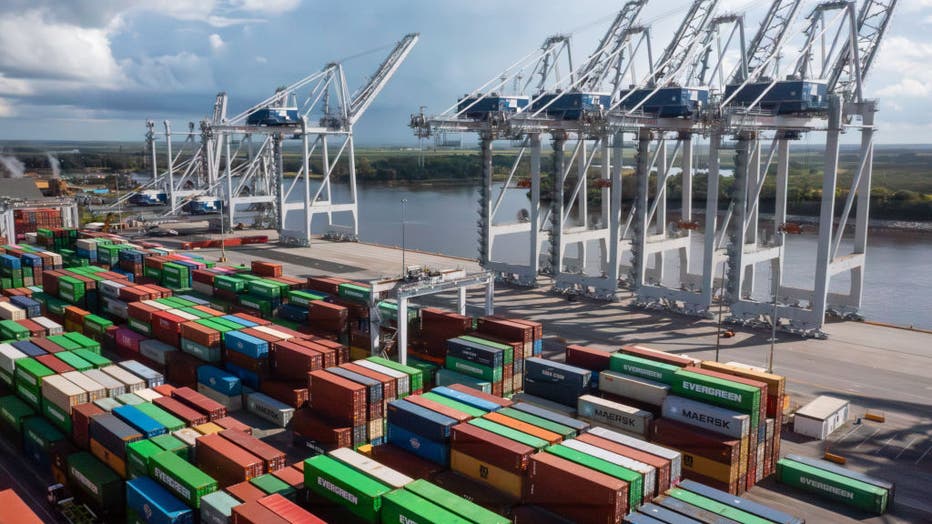Trump's tariff plan sparks economic uncertainty in Georgia
Georgia businesses prepare for tariff turmoil
Known as the best state to do business for the past 11 years straight, Georgia may be in for a future of financial uncertainty. Business owners worry Trump's tariff wars may put them in hot water.
ATLANTA - As President Donald Trump’s sweeping new tariff measures roll out, Georgia businesses are preparing for ripple effects that could disrupt nearly every corner of the state’s economy. A baseline 10% tariff on imports took effect last week, with broader and steeper tariffs set to begin Wednesday — part of a broader trade policy overhaul that is being met with both praise and alarm.
RELATED: 'It's our turn to prosper': Trump announces 10% baseline tariffs on imports from all countries
What we know:
President Trump says the goal is to correct the U.S. trade imbalance — currently pegged at $1.2 trillion — by discouraging imports, boosting domestic manufacturing, and generating revenue to pay down national debt. Trump claims more than 50 countries have reached out to negotiate, though some nations are threatening retaliation.
RELATED: China vows 'countermeasures' following Trump's threat of additional 50% tariff
Support and Skepticism
The plan has drawn support from groups like the Coalition for a Prosperous America, which represents U.S. manufacturers and labor unions, the National Cattlemen's Beef Association, the Steel Manufactures Association, International Dairy Foods Association, National Association of Homebuilders, and from Republican leaders such as Senate Majority Leader John Thune and House Speaker Mike Johnson. Democrat Rep. Jared Golden from Maine has also praised the plan. Additionally, many conservative voters have echoed support for the America-first strategy on social media.
RELATED: Elon Musk's brother, Kimbal Musk, slams Trump's tariffs
But others, including Republican lawmakers Sen. Chuck Grassley (R-Iowa), Sen. Mitch McConnell (R-Ky.), Sen. Jerry Moran (R-Kansas), and Sen. Todd Young (R-Ind.), have signed a bill that would require Congress to approve President Trump's steep tariffs. Additionally, economists are warning of higher consumer prices and squeezed profit margins for small businesses. Key concerns center around everyday goods — food, clothing, electronics — that may soon cost more as a result of the tariffs.
RELATED: Tariffs and your wallet: What Americans can expect if prices begin to rise
Georgia's Economic Exposure
With a robust global trade profile, Georgia is especially vulnerable to the fallout, according to a report from the Georgia Chamber of Commerce. In 2024, the state set records with $53.1 billion in exports and $145.6 billion in imports, ranking 7th nationally for net exports. Georgia's goods reached nearly 300 global markets.
To help businesses prepare, the Georgia Chamber of Commerce released a comprehensive analysis titled "Tariffs Briefing: April 2025 – New U.S. Tariffs + Potential Georgia Impact." The report outlines specific threats to agriculture, automotive manufacturing, construction, and port logistics.
RELATED: Small businesses in Atlanta struggle amid Trump's tariffs
"We were spending literally hundreds of hours on the phone with members all over the state and we felt it was important to give them the best information that we could." Georgia Chamber's Chris Clark told FOX 5 Tuesday.
Clark, who serves as Chamber President and CEO said they wanted to make sure Georgia farmers and small businesses understood what was going on from the US tariff standpoint, and also wanted to educate them on reciprocal tariffs being levied and how that might impact them.
Key Georgia Impacts by Sector
Local perspective:
Automotive
- Imported vehicle parts will face a 25% tariff, potentially raising production costs at Georgia’s auto plants.
- Export risks are rising, as global buyers may retaliate — particularly affecting the Port of Brunswick, the busiest auto port in the U.S.
- Uncertainty around USMCA exemptions adds confusion for manufacturers reliant on cross-border supply chains.
Construction and Manufacturing
- New tariffs on steel and aluminum will raise the price of materials, squeezing builders and manufacturers alike.
- Georgia’s construction industry may face higher costs for rebar, sheet metal, and structural components, delaying or downsizing projects.
- While some local metal producers may benefit, the broader impact could be fewer contracts and slowed development.
Agriculture and Forestry
- Georgia’s top agricultural exports — poultry, cotton, peanuts, pecans — are vulnerable to retaliatory tariffs, especially from China and the EU.
- Tariffs may raise costs for imported farm equipment, fertilizers, and feed, adding pressure to already strained farming budgets.
- Forestry and lumber are a mixed bag: domestic timber may become more competitive, but higher prices could dampen overall demand and harm relations with Canadian buyers.
Port and Logistics
- The Port of Savannah and Port of Brunswick may see swings in cargo volumes as importers rush to beat deadlines, then scale back.
- Warehouse and transport operators face uncertainty as businesses reconfigure supply chains, stockpile goods, or shift sourcing strategies.
- While infrastructure investments are helping the ports remain resilient, retaliatory tariffs on U.S. exports could slow growth long term.

Shipping containers and cranes at the Port of Savannah in Savannah, Georgia, US, on Saturday, Sept. 9, 2023. The US economy has been looking so solid lately that Federal Reserve officials will probably need to double their projection for growth in 20
Looking Ahead
What's next:
The Georgia Chamber has pledged to continue supporting state businesses through what it calls a "quickly evolving global trade landscape." In February, the chamber launched its Global Business Subcommittee to offer coordination and advocacy.
While the Trump administration argues that long-term gains in domestic investment will outweigh short-term disruption, the outcome will depend heavily on how global trade partners respond — and how quickly new deals, if any, are reached.
For now, businesses across Georgia are bracing for potentially higher costs, tighter margins, and increased uncertainty.
OTHER RELATED STORIES
- Auto tariffs are now in effect: Here's what it means for people buying a car
- Stellantis plans 900 temporary layoffs in US after Trump tariff announcement: report

